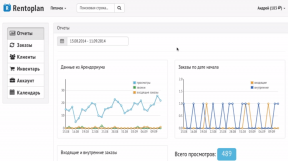Personal experience: I spend a vacation in an archaeological expedition
A Life / / December 19, 2019
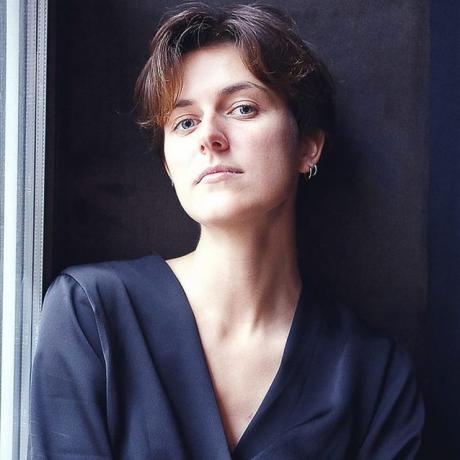
Sophia Skaldina
Volunteer archeologist. Every summer, goes for a few weeks in the archaeological Donuzlavski expedition.
When people ask me where I spend my summer vacation, say, in the Crimea. And then I hear a standard passage on bad service. Then I clarify that go volunteer at archaeological expedition: dig up to 6 hours in the heat, sleeping in a tent and eat stew. After that, people or politely say goodbye, or asked to tell in detail.
I'm not a historian or archaeologist. First expedition was in 2009: our university organized practice for students, historians, and I - a student of the department of advertising - arrived quite by accident. That's the first time I came to the Crimea, in Donuzlavski archaeological expedition "Mound Kulchuk". For the first time in my life I had gone out of the house in a totally wild conditions. And for the first time realized in life that I found a place where I will return.
Yes, archaeological expedition - is very extreme recreation. But also a unique experience that allows you to dramatically change the frame of reference, to be alone with him, and reboot. Plus, as a rule, you come back with a tan, make new friends and funny stories, in which precisely would not have fallen into the "normal world".
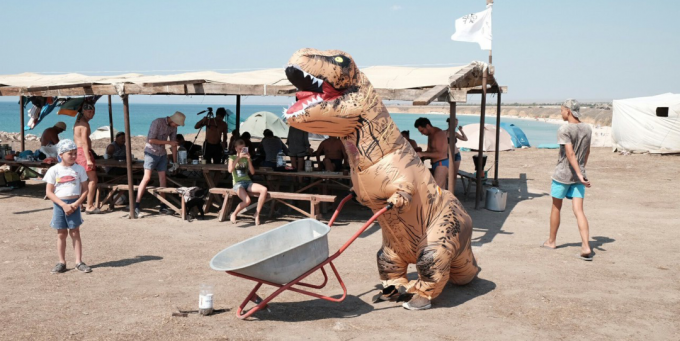
Ash Hill and ceramic souvenirs
Our expedition is located on the picturesque cliff on one side - the sea, the other - the steppe. In two steps - the wild beaches. Standing beside the sea: you wake up and fall asleep to the sound of waves. Every night we watch "The Decline of TV", and night sticks to the Milky Way.
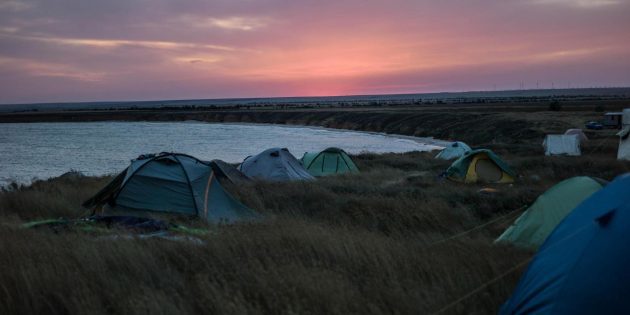
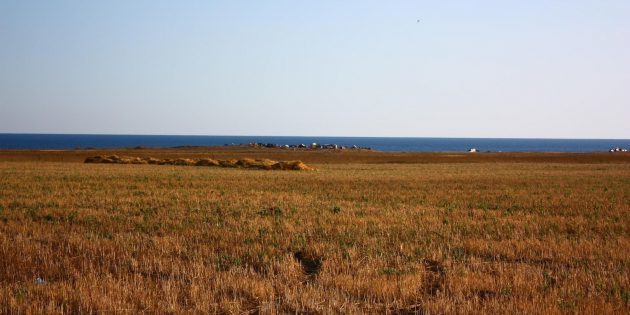
We dig a Greek mansion under the working title Kulchuk - Turkic "Ash Hill". Est dating - IV century BC. e. No one knows the name of this place in reality. Every year, we hope to find a sign with a message like: "Here we are 600 people, 15 goats and 2 seals. And our city is called... "But instead we find another thing, face new thinking and hypothesis.

The expedition did not come by itself. To place it, you need a so-called open list - "license" to the excavations. It is issued by the Ministry of Culture at a specific person (expedition leader) and concrete excavations. It must receive prior to each season. Our excavations are held in July and August. This is due to the fact that the basic "employment" footage - it interns, students, and the need to wait until they pass examinations. Plus the weather is the most comfortable and nedozhdlivaya.
Open the sheet means that the excavations are of an exploratory nature. In 90 years in the Crimea, managed for a while "black diggers" - the people who walked with metal detectors and dug up everything that is ringing. Local ads on sites still sell rare coins, a place that in the museum.
Open list also means that we dig, "not for himself": so all the finds fix (or photographs we sketch) and pass to the nearest regional museum in the village of Black Sea. So take with a cranium fail. But we have a deposit unnecessary pottery, fragments of which we use as souvenirs.
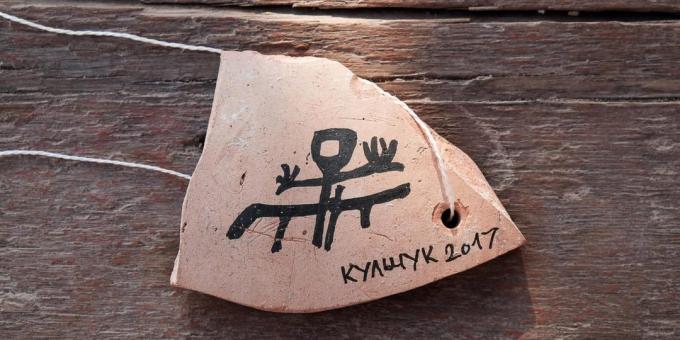
Equal rights on the excavation
The cries of duty "Kulchuk, rise!" Camp wakes up at 6 in the morning. Then we had breakfast, and at 7 o'clock at the cry of "On the excavation!" Go to work. Digging to 13:00, with a break every hour. If someone is not feeling well, it does not work out, either otlozhivaetsya or helps duty.
At the excavation site there are three types of work: to strip, digging or process finds.
When you take a sweeping brush, sovochki and start to clean the already excavated space of grass, dust and excess land. Typically, the cleaning is carried out before release (photographing section) or when it is necessary to understand what is, we have unearthed. Sweep - this is a very meditative process. You sit yourself, you wave a brush and talk to the person sitting next to. Or - after a few hours in the heat - with an imaginary friend.
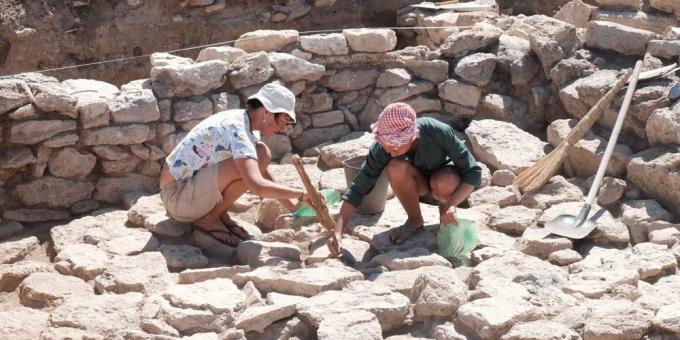
The second version of the work - is to dig. In case you or break new square (dig from the ground), or work on already excavated square (expanded or enhanced). New squares sometimes split on the basis of geomagnetic research: on the field goes a man with a backpack and something metal detector. This device detects vibrations caused by all kinds of materials (e.g., ash) due to their different magnetic properties. On the basis of these data, it creates a kind of underground map with promising areas. We dig in layers, bayonet spades. Excavated soil wheelbarrows and stretchers send to the dump - the highest point of the camp.
Once we have the whole day digging a new site, which was not so new: at a depth of a meter, we found an old a pack of "Marlboro". She could stay or from the "black diggers", or from another expedition. Like modern artifacts researchers note already excavated areas. Sometimes buried a bottle with a note on which indicate the year conducted excavations and information about the expedition. And we are still amazed at what this land is so supple and surprisingly easy to dig ...
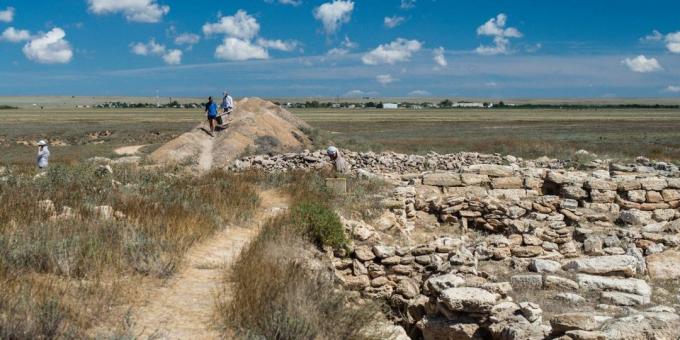
Before digging boys and girls were cleaned. But equality triumphed: Now dig in and cleaned can be anyone. Of course, the guys will still help with heavy buckets or stones. Generally, help each other - one of the golden rules of life in the expedition.
Finds from each square are formed in a separate container, then they are washed and cleaned from dust. Interesting and important artifacts (pottery fragments with inscriptions, ornaments or beads, household items), sketched, and the rest is thrown on the ceramic blade near the camp. For the treatment of findings, we put a special tent - "keramichku".

"What? Where? When? "And the evening by candlelight
After the end of the excavation all go to the sea - to wash off the dust. Then begins his spare time (of course, with breaks for lunch and dinner).
After 14:00 Life in the camp is moved under the tent. There are dining tables and benches, there we are saved from the Crimean heat. In his spare time, you can do anything: to swim, read, sleep, chat, help around the camp, playing in all sorts of mafia-charades, crocodiles or go to the nearest village for ice cream (3 km across the steppe).
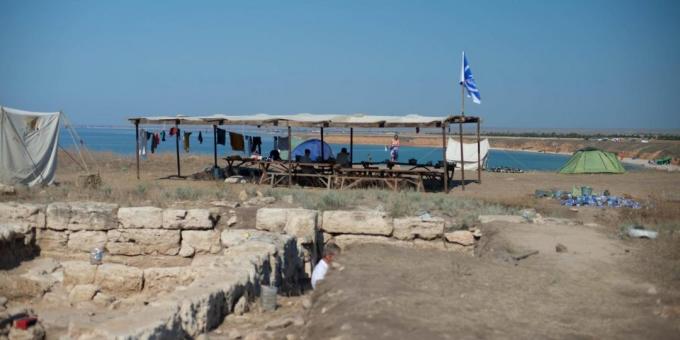
Each season we organize a contest "Mister and Miss Kulchuk" and celebrate the Day of the archaeologist in mid-August. Sometimes hold tournaments, "What? Where? When?". It looks very epic: instead of coats and evening dresses on our bathing suits and dusty shorts, and instead of a gong - hung basin, which beat the ladle.
After sunset, the time comes to evening gatherings by candlelight. No, we do not romanceJust we do not have electricity. Everyone has a flashlight with which you can move around the camp at night.
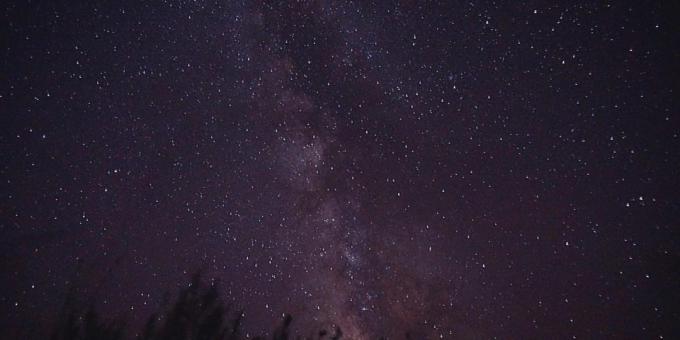
At 23:00 in the retreat camp. This means that those who want to go to sleep. And who does not want to move to the beach, so as not to disturb others. Especially clearly we follow this rule, if the camp have children. You go to sleep at any time and in any place. Sometimes in tents very stuffy, so we kuchkuemsya and spend the night in sleeping bags on the beach. But it is important to remember that no matter where you are, and able neither to sleep, the next day at 7 am to be at the dig.
Feasting Heracles and skeletons
Studies settlement Kulchuk conducted more than 100 years, and the efforts of our expedition - since 2006. According to conservative estimates there to dig more 200 years, no less.

The most top-end discovery of our expedition - high relief with feasting Heracles (located in the museum of the Black Sea). This finding is not only interesting to look (limestone slab with the figure of a man lying), but also a lot of reports about the settlement: it turns out that people who lived in it revered the cult of Hercules. In 2017, we found the altar - a flat stone, the specifics of which are still pondering.
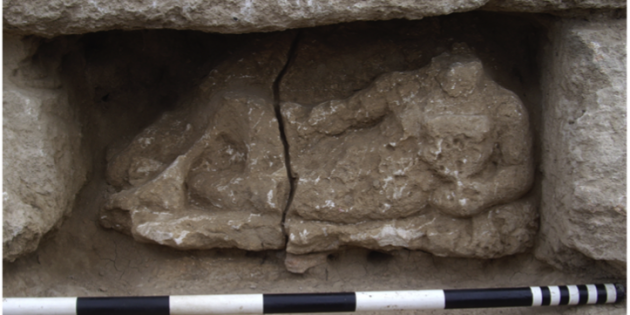
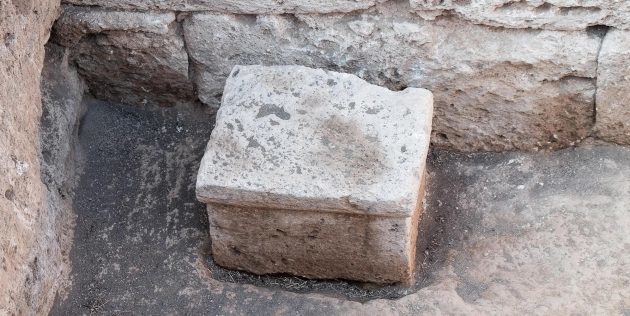
Every day we find animal bones and shards of pottery: red and black Greek Scythian.
Among pottery valuable finds fragments are considered "airfoils" (bedplate, neck, pen) or fragments with the stamps (words or symbols). A form of "core parts" helps to date the find, and the mark - to determine the period more precisely. With ceramics can learn more about the trade relations settlement: where have brought one or another vessel.
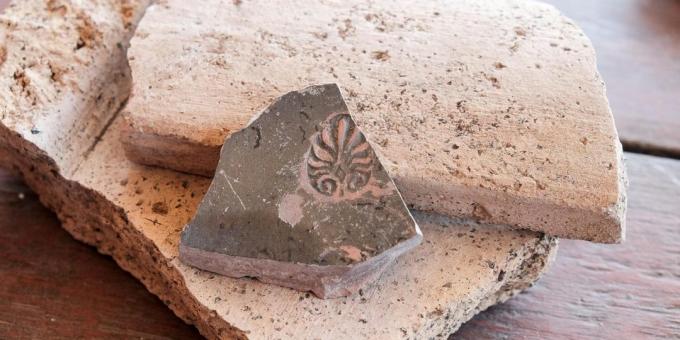
And human skeletons were found. One of them I have found: entered the excavation, stuck a shovel, teased something - and I literally jumped skull. They say that my cry was heard even on the beach.
We do not believe in the curse of Tutankhamun, but still very thrifty use of found people, we clear them, classify (Determine a person's age and sex), photograph, then gently to pieces and put in a bag on the ship examination.
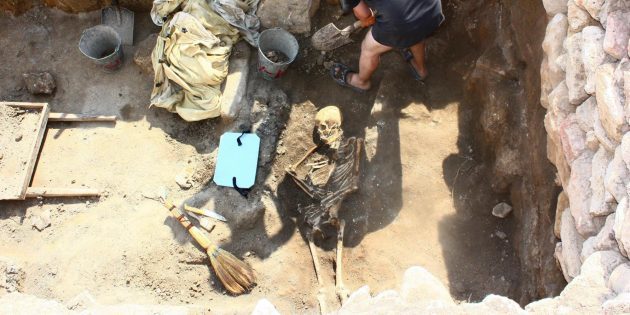
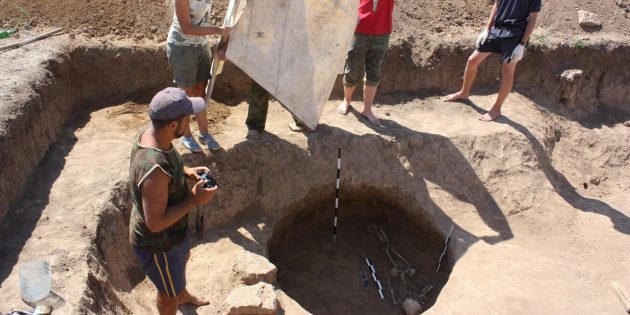
We also find, and various architectural elements: stairs, arches, tunnels and towers. In 2009, we found the six-meter underground tunnel. The walls inside were covered with clay, on which fingerprints are preserved.
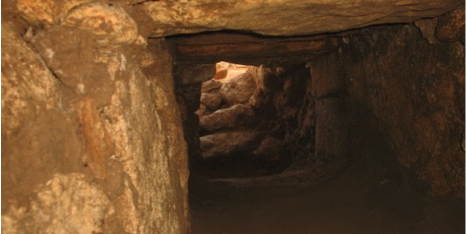
consumer question
We are living in tents. We are sleeping in sleeping bags. From other facilities in the camp have a tent, under which there are tables for dinner and general get-togethers, a huge tent, where something like a warehouse and a hospital, and "keramichka" - tent with the findings. Naturally, there are toilets and a kitchen-type toilet. We are preparing the gas, because fires steppe burning is prohibited.
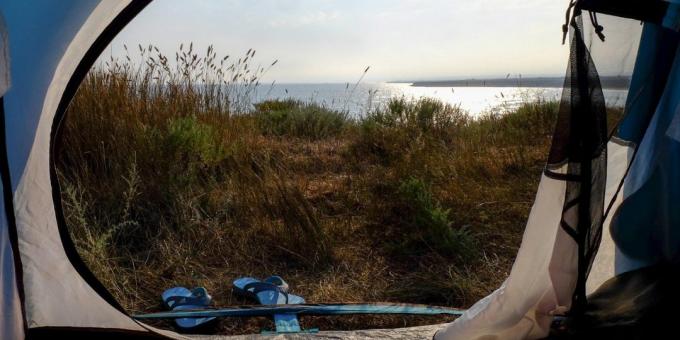
Every day appointed duty that do not dig and cook and doing camp. Food - pasta, cereal, stew, canned fish, soups, stews, vegetables, fruits and melons. For breakfast - cereal, tea, coffee, cakes and fresh dairy products from villages. Eat dishes from the field, the total for the whole camp. For vegetarians there is always a separate saucepan, which do not add to stew. My dishes in the sea, then rinse in fresh water and potassium permanganate. Water bring us drinking, cooking and technical. You can wash in the sea, and just rinsed with process water.
Most of the rules that govern the forwarding life, dictated by experience and safety considerations. All newcomers we conduct a detailed briefing. For example, we say that the tent is better not to smoke: it burns for 20 seconds, dripping molten plastic on you.
The most common health problems - is overheating and poisoning. But they can be easily avoided if you follow safety rules (not to go to the excavation without a hat) and hygiene (wash hands, fruits, vegetables and dishes). The expedition is always a first aid kit, car and communication with the outside world. If a person needs rest in bed, It is sent to the village. If you happened something serious, then there is a hospital in the Black Sea.
It happens and natural force majeure. In 2011, he began the night a terrible storm: lightning were those that covered the coast for a few tens of kilometers! Povalii of the tent, dropping tent. The next day we were looking for dried pasta and Gone things. Sometimes the camp comes hot and strong steppe winds. The funny thing about his property - a soup spoon to blow in the face of someone, so in those days, lunches are especially fun.
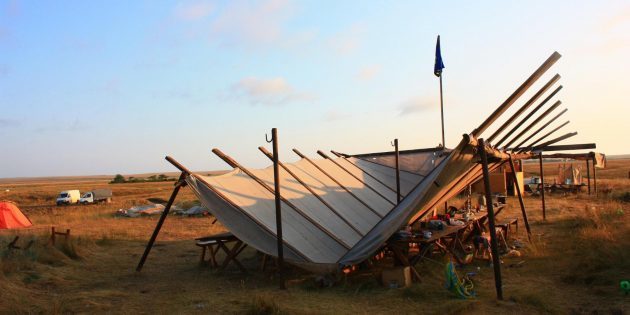
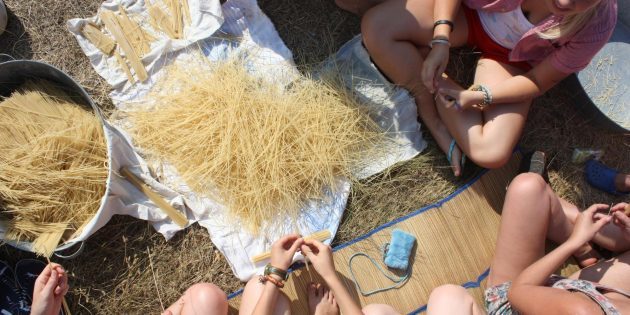
information detox
As I said, we do not have electricity. Phones and cameras, we go to the village to charge (remember, 3 kilometers across the steppe) or we return to the charging of local people who are helping our camp. Sometimes someone brings solar panels, used by the whole camp.
In general, the sense of ownership in the expedition somehow dulled. By the middle of the season under the awning formed a mountain of things, enjoyed by all: books, Toothpaste, Sunscreen, and so on.
When I arrived for the first time in the camp barely caught phones. Now there is even LTE. A couple of years ago, we used to joke that once we tweet each other on the excavation, and now it is able to do so. Yet people want to somehow shut down and arrange information detox: some take with them the old push-button phones.
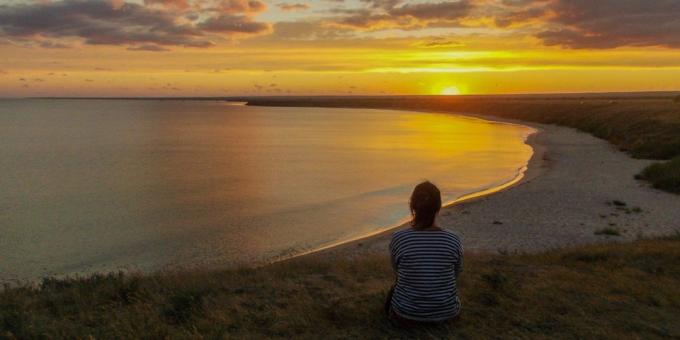
How to get to the expedition
Almost all of the Expedition are pleased to volunteers. Often do not even need to have special education (we have, for example, digging physics, programmers, journalists and other strange people). Any restrictions dictated by common sense: children up to 18 years - only to adults; I do not recommend to go for those who have serious health problems.
However, the expedition did not come better than with a joyous shout "Surprise!" Firstly, because the food is purchased based on the estimated number of participants. Secondly, access to many expeditions very problematic, and it is better to warn about his visit to help you navigate.
It seems to me that for the first acquaintance with the life of the expeditionary enough weeks. The first visit is important just to understand your or not. By the way, it turned out that my first expedition lasted as much as four weeks; then I was so wild, that has forgotten how to use tap water.
Everyone has their own reasons for coming to the expedition every year. I like to disconnect from the familiar life, completely changing field of activity. Of course, I was very lucky in my time, I got in a cool place and cool people.
And yet the expedition - a single organism, and specific team building. There is an unreal feeling of oneness, when you dig together, wash the dishes or catch flying away from the cliff tent.
see also🌌🌊🚗
- As the budget to go to Iceland: personal experience
- How to rest in Japan: a personal experience
- Personal experience: I lived a day in style Elon Musk



